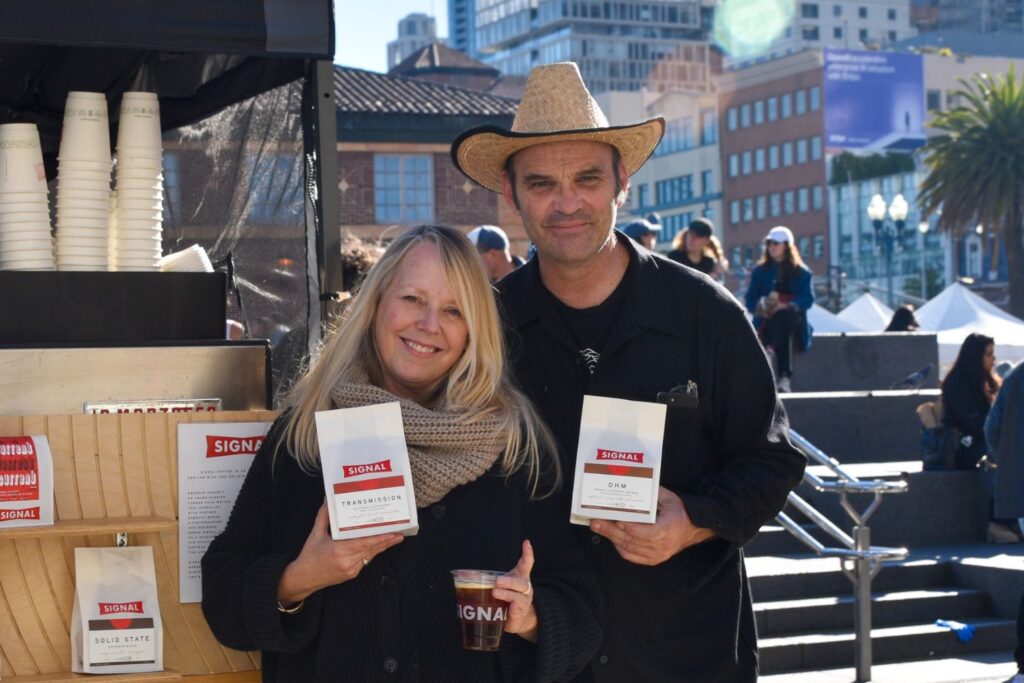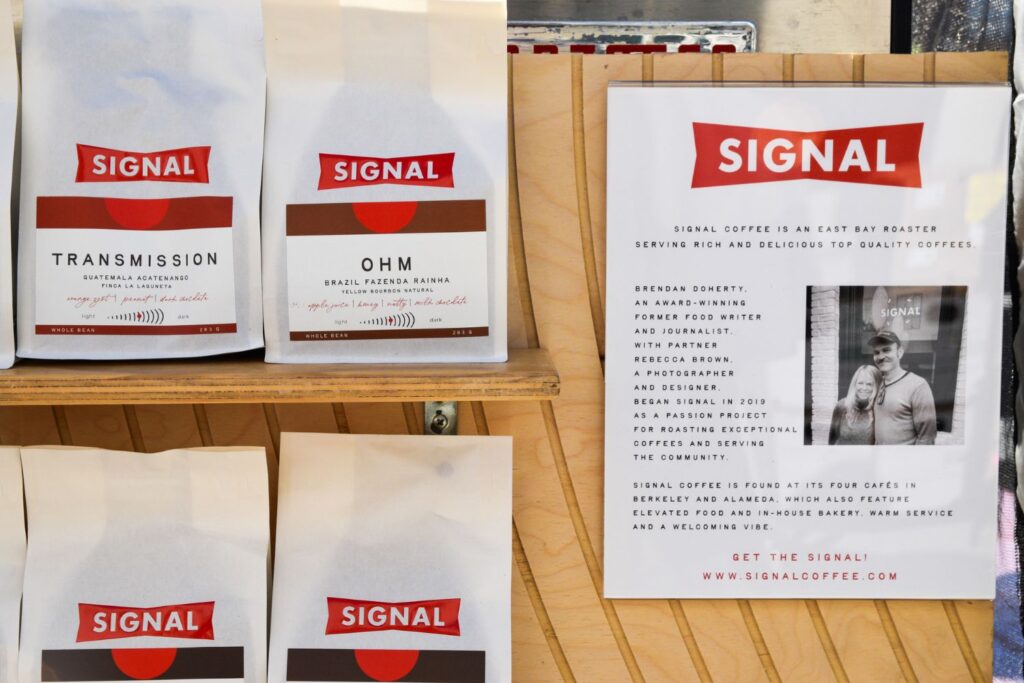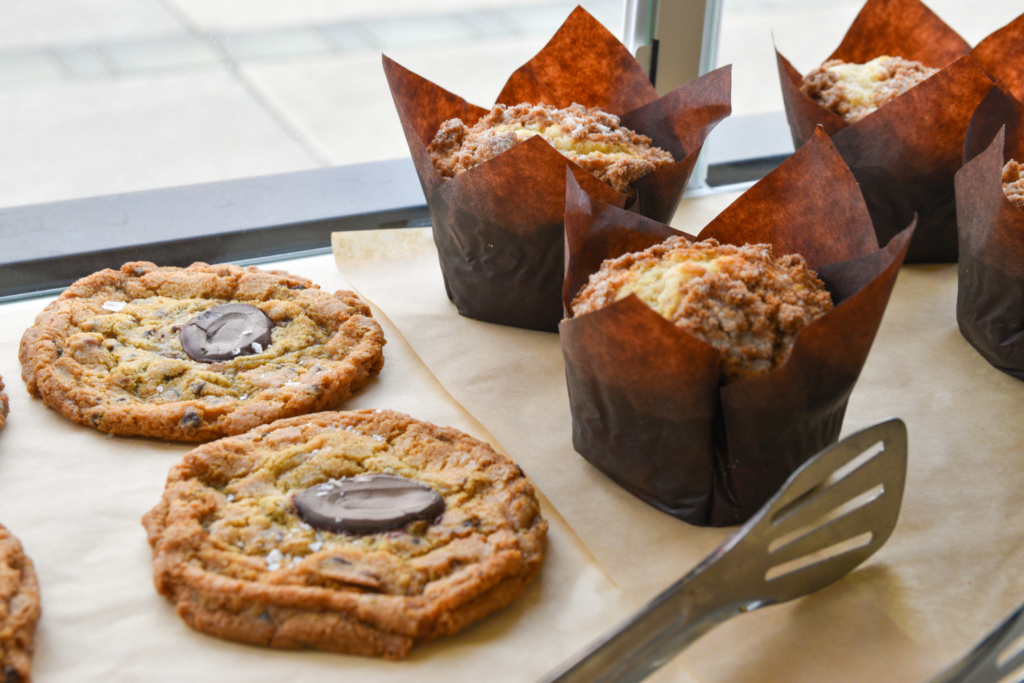Meet the East Bay Coffee Roasters Making Waves in San Francisco
Sheree Bishop, Communications Coordinator
April 11, 2025

For Brendan Doherty and Rebecca Brown, what started as a way to share great coffee with friends and neighbors grew into a staple of their local community in Alameda. Now, Signal Coffee Roasters has two locations in Alameda, two in Berkeley, and a new stand at the Ferry Plaza Farmers Market on Tuesdays, Thursdays, and Saturdays in San Francisco. On both sides of the Bay, coffee lovers can enjoy carefully roasted brews coupled with a variety of pastries that are made in-house every day.
Reconnecting: From Friendly Neighbors to a Neighborhood Staple
Brendan and Rebecca first met in Albuquerque, New Mexico. When Rebecca moved away, the two lost touch. “Life moved forward,” Rebecca says. “I moved to New York for a few years. I moved back to Cape Cod for like 15 years. After my husband died, I came out here. I had friends in the Bay Area and friends in LA.”
After moving to the Bay Area, she and Brendan reconnected. Rebecca says, “Our lives kind of came back together. And the minute we started talking, it was right there, what we had left behind.” As a gift, she bought Brendan a coffee roaster, knowing that he had a growing interest in making coffee.
At the time, Brendan was a journalist working on Battery Street in downtown San Francisco. “The thing I loved about moving to San Francisco was the coffee culture. After Rebecca gifted me a roaster, that was our jumping-off point. I was just suddenly, deeply obsessed with making fantastic coffee.”
Amplifying from Alameda to the Bay: The Origins of Signal Coffee
Brendan and Rebecca began roasting coffee at home for themselves and for friends. In 2020, during the height of the pandemic, they shared their coffee with door-drop deliveries to their neighbors. A year later, in 2021, they opened their first cafe in Alameda. When they chose “Signal” as the name of their business, the pair were looking for a name that carried its own meaning.
“You start with a cup of coffee, and then you’re sitting and you’re talking with someone, and then they bring friends, and it kind of spreads the signal, in that way as well. The original basis was on electronics, but it kind of translates everywhere,” says Rebecca.
The name also alludes to the connections needed to source high-quality coffee from around the world. Brendan says, “It struck me how similar the process of seed to cup was to the process of making music, from the microphone to the amplifier. It became a nice way for us to talk about what happens with coffee from different parts of the world, how it travels, and the process of making it.”

Sent and Received: Global Connections and Sourcing Coffee
Signal gets ethically sourced, single-origin coffees from smallholder farms in Brazil, Guatemala, Honduras, Mexico, Ethiopia, and Costa Rica. According to a 2024 study, 95% of the world’s coffee farms are smallholders, working with farmland smaller than 5 hectares, or 12 acres.
Whether or not a coffee farm qualifies as a smallholder varies from region to region. In countries like Brazil, where farms tend to be larger, smallholders may hold more than 12 acres of land. These farms can also be characterized by their access to resources and their ability to operate multiple aspects of the supply chain, from harvesting to processing.
Across the board, however, many smallholder farms struggle to make ends meet. Out of 12.5 million smallholder farms, 44% live below the international poverty line of $3.20 a day, with some farmers making less than $100 a year from their crops.
“We pay a premium for our coffees,” Brendan says. “They’re graded for quality and selected for flavor. Those premiums are paid back through the value chain.” They’ve also begun to source processed coffees from Guatemala, Honduras, and Ethiopia, where suppliers provide additional value through processing and fermenting coffee.
Interference: Adapting to Tariffs and Climate Change
Most specialty coffee, like the ones that Signal offers, is made with the Arabica variety of the coffee plant. Compared to its counterpart, Robusta, the Arabica bean results in a final product with sweeter and more nuanced flavors. Brazil is the largest producer of Arabica, making up 38% of the global coffee market.
In 2024, Brazil suffered a severe drought brought on by deforestation and increased greenhouse gas emissions. Vietnam, another large producer of coffee, suffered a similar, severe drought. Scientists have confirmed that climate change is causing a shift in the agricultural output of regions along the coffee belt, as well as other warm regions responsible for popular goods like cashews and avocados.
In response, many major coffee brands raised prices, while smaller roasters had to decide between raising prices to keep up with rising costs or maintaining prices to avoid scaring people away.
“This is a time when those margins begin to shrink and the relationships become even more important for a small business like us in cities like Alameda and Berkeley, and at the farmers market here,” Brendan says. “There’s three people here at the farmers market today, but we’re 40 people in the East Bay and San Francisco. The cup that supports all of that, it’s not a small thing.”
Though the Trump administration recently announced a 90-day “pause” on their heavy tariffs on foreign imports (with the exception of a 125% tariff on Chinese imports), the effects of the current trade war still impact small businesses. During the “pause,” the Trump administration will enforce a 10% tariff on all foreign imports, which is still higher than historic tariffs imposed by previous administrations.
“It’s challenging to keep the level of quality that we insist on because that just inevitably means that it’s more expensive now than it was in November or January last year. We’ve had to double down in our resolve to commit to the level of quality that we started with,” Brendan says.

On the Same Wavelength: Branching Out Across the Bay
Signal joins a lucrative roster of large Bay Area coffee roasters that have gone through the Ferry Plaza Farmers Market. When Proyecto Diaz Coffee left the market, they supported the transition by selling Signal some of their market equipment, and Signal brought their former market manager onto their team. At the farmers market, shoppers can find Signal’s specialty coffee and pastries in the same place where Proyecto Diaz once set up shop.
As they settle into the market, both Brendan and Rebecca have found the community of vendors and shoppers to be the most rewarding part of joining the Ferry Plaza Farmers Market. “We’ve met so many people so far and everyone is just warm and generous and kind and super supportive. It’s been fun,” says Rebecca. “We haven’t been able to stay away. Every weekend we’re like, ‘Well, what else are we doing? We should go over there.’”
“The energy here among the community and the vendors is probably the best part. There’s generosity, there’s reciprocity… we have other locations, but none of them have the spirit that this has,” Brendan says.
Complementing their coffees, Signal brings a menu of seasonally rotating baked goods. At their kitchen in Alameda, the pastries for all of their locations are baked fresh every day with seasonal flavors inspired by the Bay Area. Brendan says that, in selecting flavors, they try to invite people in and incorporate the ingredients and palates that are popular nearby. For example, their Ube Latte and Blube (Blueberry and Ube) Muffins reflect the tastes of the Filipino population in Alameda and the Bay Area at large.
Brendan says, “There has never really been a place that has great coffee and great pastries. And for us, that’s the overall vision we wanted to achieve. A place that was warm and inviting and that you want to go out of your way for.”
Visit Signal Coffee Roasters on Tuesdays, Thursdays, and Saturdays in the Ferry Plaza Farmers Market.
Topics: Entrepreneurship, Farmers market, Small business
